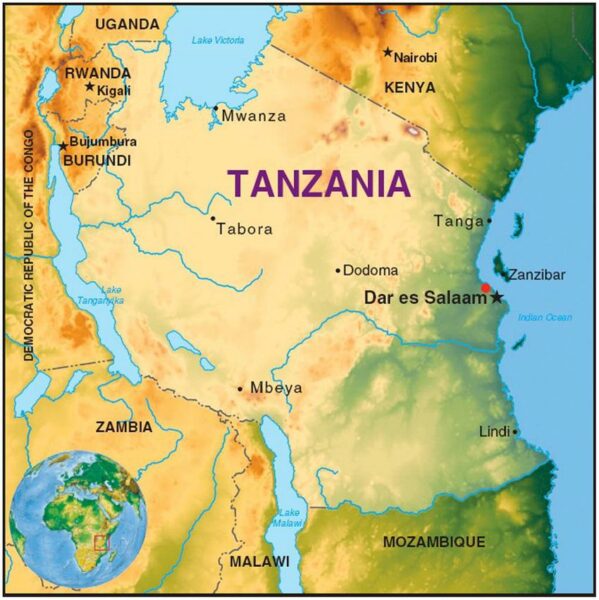Map of Tanzania
Research Gate
In the heart of East Africa, Tanzania is scripting a tale of economic ascendance under President Samia Suluhu Hassan’s leadership. From 2021 to 2023, Tanzania witnessed an economic surge, with investments soaring to an impressive $8.6 billion. This exponential growth, a staggering 173% increase, is a result of ongoing efforts to enhance Tanzania’s business climate, as reported by the Tanzania Investment Centre (TIC). Real GDP growth is projected to increase to 5.3% in 2023 and 6.3% in 2024, driven by the sustained recovery in tourism and gradual stability in supply and value chains.
Hassan’s approach stands in stark contrast to her counterparts in African leadership, marked by a cautious optimism tempered with a pragmatic outlook. Her leadership style, characterized by a blend of confidence and pragmatism, has set her apart in a region marred by a mix of economic growth and uncertainty.
Such robust growth underscores the effectiveness of Tanzania’s blueprint for regulatory reforms, which has improved the business environment, attracting investors from various sectors. President Hassan’s administration has been characterized by a more straightforward approach to attracting foreign investment, a feat that few leaders on the continent have managed to achieve with such finesse. Her confidence in Tanzania’s economic potential is evident, drawing investors from far and wide to the shores of this East African gem. However, she understands all too well that stability is the cornerstone of economic growth and isn’t afraid to talk about it. At a women’s conference in Zanzibar in 2023, President Hassan captivated audiences with her passionate speech about Tanzania’s economic prowess, citing the country’s stable political climate as a key driver of its economic success. At the same conference and on other occasions, President Hassan delivered subtle jabs at Kenya, underscoring Tanzania’s ambition to emerge as the dominant economic force in East Africa.
The number of registered projects receiving investment funding saw a notable uptick from 455 to 575 between March 2021 and February 2023, marking a substantial 26% increase. Even more remarkable is the distribution of these investments, with Tanzanians owning 32% of the projects, led only by foreign investors at 41%, and joint ventures between local and foreign entities accounting for 27%. These investments didn’t just inject capital into the economy; they also generated employment opportunities, with the number of jobs created increasing from 61,900 to 87,187 during the review period. Tanzania’s industrial sector, in particular, experienced a significant boost, with investments soaring by 49.43% over the past two years. Commercial building construction and transportation sectors also saw impressive growth increments of 17.51% and 11.07%, respectively.
Another notable development in Tanzania’s economic landscape is the burgeoning partnership between Tanzania and Australia, particularly in the mining and energy industries. Australian companies have poured billions of dollars into Tanzania’s mining sector, drawn by the country’s favorable business ecosystem and abundant natural resources. This partnership not only reflects Tanzania’s attractiveness as an investment destination but also highlights President Hassan’s proactive approach to fostering international collaborations for economic growth.
Yet, beneath the veneer of diplomatic rhetoric lies fierce competition for foreign investment, market dominance, and regional influence. Most African leaders attempt to shift focus to external factors as the reasons behind socio-economic downturns, instead using those moments in additional pleas for aid. This does extend to other countries as there is an element of protectionism around Africa’s image in the world. There is beneficial and sensible political reasoning for that strategy, benefits, but also the act of making space for the looming shadow of colonialism and imperialism in the continent’s history.
While Tanzania’s economic resurgence has been remarkable, it hasn’t come without its fair share of obstacles. The rivalry with Kenya, Tanzania’s East African neighbor and economic contender, looms large on the horizon, casting a shadow over the region’s economic landscape. Kenya’s economic capacity and strategic positioning pose a formidable challenge to Tanzania’s ambitions. With its vibrant tech sector, robust financial markets, and strategic location as a gateway to East Africa, Kenya remains a force to be reckoned with in the region.
There are also Tanzania’s internal challenges, and President Hassan’s administration is not immune to them. Infrastructure deficits, technological barriers, and a shortage of skilled labor threaten to derail Tanzania’s economic momentum. There are also open questions about sustainability. Tanzania’s ESG strategy is not clear, and while it is not a requirement, many economists and energy development experts have noted that dedication to renewable energies is needed to sustain Africa’s growing population, as well as to adhere to U.N. sustainability goals.
As Tanzania’s economic trajectory continues to ascend, President Samia Suluhu Hassan’s leadership will be put to the test. Navigating rivalries, combatting corruption and promoting transparency, and seizing opportunities will require a delicate balance of diplomacy, innovation, and strategic foresight. Tanzania’s next few years are likely the most crucial, as it tries to seriously develop strong internal economic engines and prioritize sustainability with help from considerable foreign investment. Despite these challenges, President Hassan makes a notable refreshing break from that, with a certain edge of competitiveness and more honesty in the development discourse.
Special thanks to Mr. Owakhela Kankhwende, who also assisted with research and contributed to this article.
Source link : https://www.forbes.com/sites/earlcarr/2024/03/06/tanzanias-economic-ascendance-the-new-business-ecosystem/
Author :
Publish date : 2024-03-06 03:00:00
Copyright for syndicated content belongs to the linked Source.
